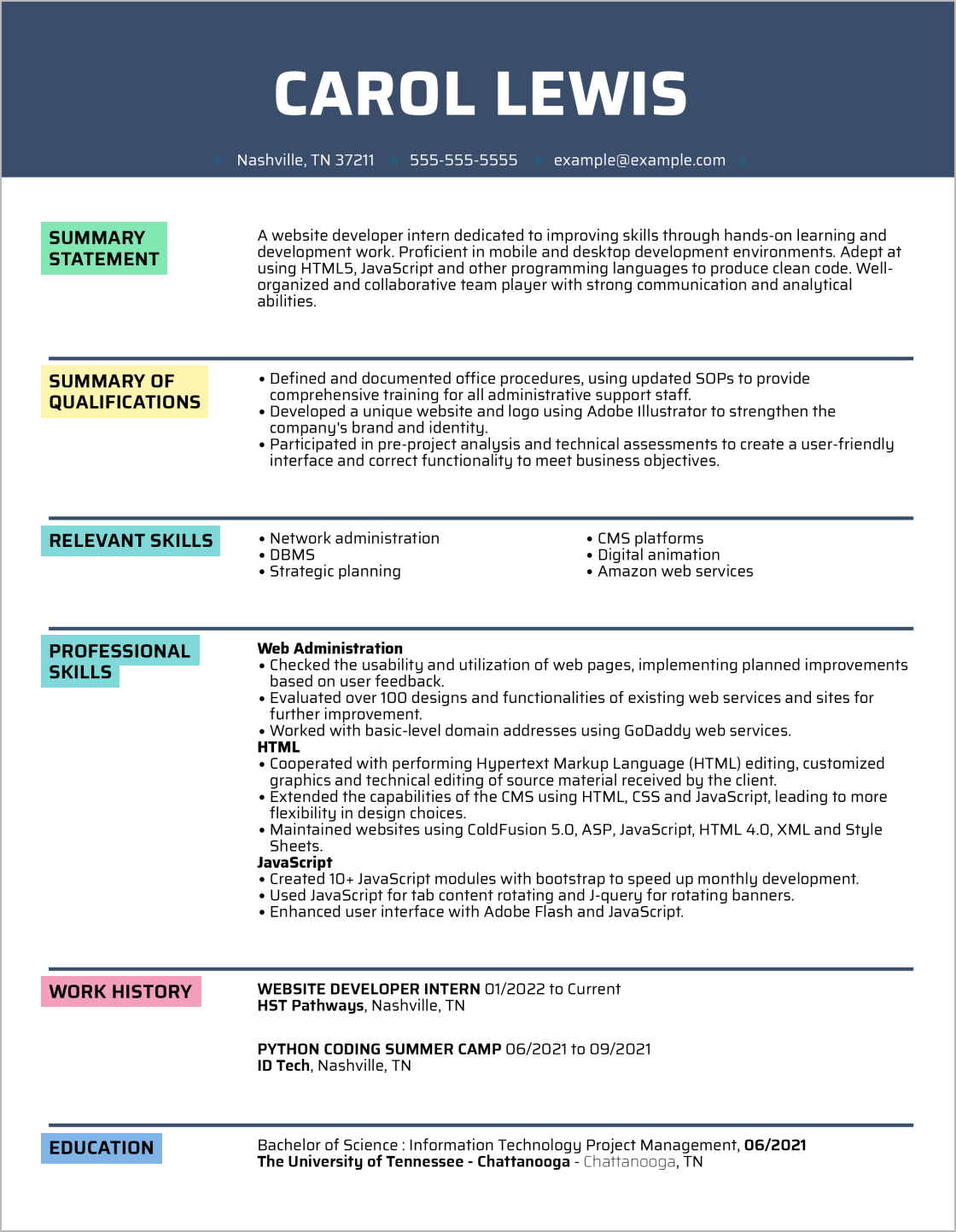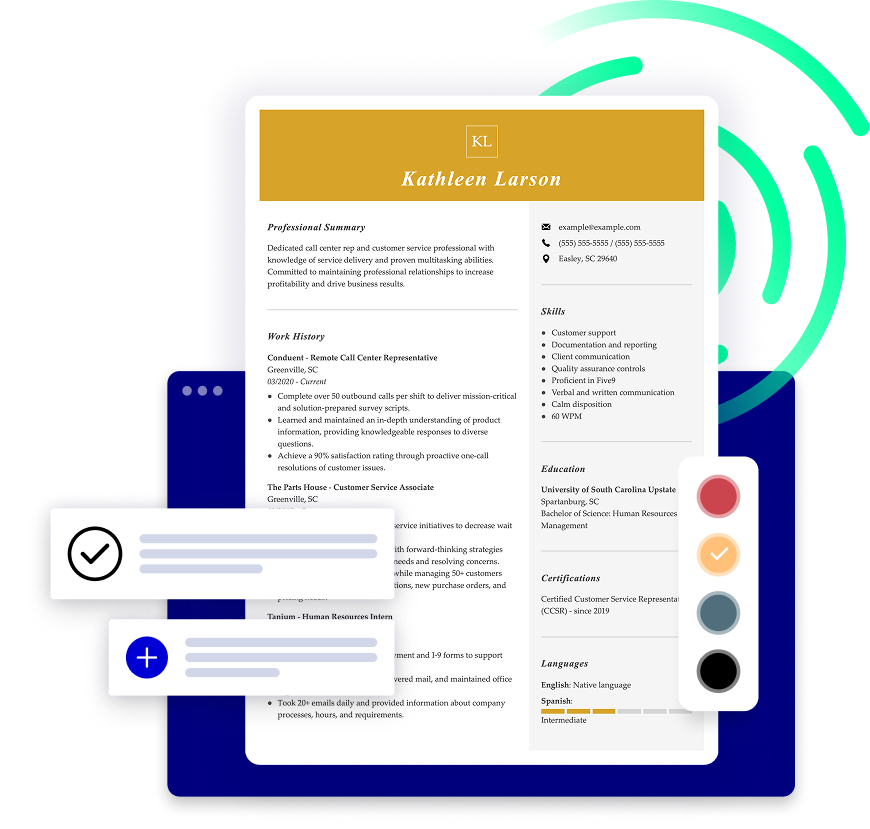How to List Hard Skills on Your Resume (115 Examples)
You should include helpful, hard skills on your resume to land a job. Here, we outline what they are, provide 115+ examples and explain how to list hard skills on a resume.
Hired By:*


TABLE OF CONTENTS
What are hard skills?
“Hard skills” like cash handling, typing or presentations are abilities to perform a job, task or goal.
Hard skills are easy to prove, measure or quantify. You attain hard skills through school, previous jobs or self-education.
Very specialized hard skills like computer coding, welding or graphic design are sometimes called technical skills.
This is in contrast to soft skills like communication, self-motivation or attention to detail, which are more innate personality traits or social skills. These are harder to learn, measure or prove.
Hard skills vs. soft skills
Here’s a table that provides examples of hard and soft skills:
Hard skills refer to what you do to achieve a goal or accomplish a task. Soft skills refer to how you reach success.
This difference matters because you should include a mixture of both types on your resume. After all, no one wants to hire someone who may be capable but lacks interpersonal skills.
Why hard skills are important
Applicant tracking systems (ATS) scan resumes for keywords and phrases to identify the most qualified candidates and get used on 90% of online job applications*.
These words and phrases typically relate to the specific skills and experience required to perform the role successfully. In other words, ATS scans your resume for hard skills, making it critical to list them throughout your resume.
You’ll miss out on the job if you don’t include the right skills on your resume or CV!
10 top hard skills examples
Below are the 10 hard skills most sought by employers. Review this list to determine which skills apply to you:
1Sales
Your ability to close deals and keep clients happy directly impacts many industries. Showcasing your special sales skills will help convince employers that they’ll make more money with you on the team.
Sales skills examples:
- Meeting quotas
- Product knowledge
- Marketing
- Contract negotiation
2Languages
Whether you speak and can translate a foreign language or specialize in a specific computer program, your abilities are in high demand. It might be a good idea to mention your proficiency level to show you’re a good fit.
Language skills examples:
- Translation
- Spanish
- HTML
- Javascript
- Language teaching
3Design
We live in a visual world where thoughtful design can make or break a business. Good design principles determine how potential customers respond to images, packaging, websites and products.
Design skills examples:
- Wireframing
- Prototyping
- Photoshop
- Web development
4Programming
We live in a digital world, so your knowledge of different programming languages and skills in troubleshooting and debugging are valuable for many tech roles. Be sure to highlight your specializations to speak to an employer’s needs.
Programming skills examples:
- Coding
- Cloud computing
- Algorithms
- SQL
- Web development
5UX
User experience or UX refers to your ability to understand what someone sees and feels when they use a product, website or service. It demonstrates how well you can identify problems and make the overall experience more enjoyable for your users.
UX skills examples:
- Design
- Content strategy
- Product enhancement
6Cloud computing
New technologies have changed the landscape in which many people work, and companies need cloud computing experts to thrive. You’re in high demand if you’re familiar with software as a service (SaaS) or maintaining cloud-based networks!
Cloud computing examples:
- Database management
- Cloud security
- Application programming interfaces (API)
7Data analysis
Analysis and critical thinking have many important business purposes, from viewing data to financial forecasts. Especially if you’re applying for a management position, analytical skills significantly impact your ability to identify, prevent and solve problems.
Analytical thinking skills examples:
- Data analysis
- Research
- Testing
8Accounting
People who know the best accounting tricks and tax code loopholes are in high demand because they can save companies money. Advertise your attention to detail and any special training or certifications.
Accounting skills examples:
- Bookkeeping
- Budgeting
- Payroll
- Billing
9Presentation
Only some people feel comfortable with public speaking. So, if you’re good at organizing and presenting information that makes it easy for people to understand, you should advertise these skills as they’ll help put you in high demand.
Presentation skills examples:
- Slideshows
- Data modeling
- Powerpoint
10Writing
The power of words serves many purposes, including advertisement, technical writing, customer outreach and internal communication. If you specialize in a particular writing format, mention it.
Hard skills examples:
- Brand voice
- Content strategy
- technical writing and marketing
If you want professional suggestions on which hard skills to add to your resume, check out our best tool, LiveCareer’s Resume Builder.
Our resume builder takes out the guesswork of creating a great resume because it combines the advice of our career advice experts with automated help.
It walks you through writing a resume step-by-step and provides hard skill suggestions targeted to the job you’re applying for.
It makes resume writing easier and can save you a lot of time. You can have a resume ready in just 15 minutes!
How to add hard skills
to your resume
Below, we show you where and how to list hard skills on your resume:
Summary statement
Your summary statement conveys to an employer what you bring to a role in two to three sentences. Mention a few of your top skills here to show employers what you bring
Summary of qualifications
Including a summary of qualifications in your functional or combination resume is a great way to show how you learned specific skills and use them both inside and outside of work.
Designated skills section (or sections)
This is the ideal place for hard and soft skills on your resume, so add a mix. Be sure to include the hard skills cited in the job posting if you possess them. It’s standard to list a total of six to eight skills.
Work experience
Your work experience section is where employers see how your expertise and background effectively display your hard skills. Include numerical metrics to reinforce your skills in this section, such as “Managed a team of six people.”
Education
The education section can be a dedicated spot for certifications, company training programs or relevant online courses — that way, employers have easy access to the institutions and programs where you learned your hard and technical skills.
10 Popular hard skills for resumes in 2024
Technology moves quickly, and new hard skills have recently become more desirable for employers.
Especially if you’re applying for a job that relies on technology and computer skills, make sure you’re up-to-date on these trending hard skills:
13D Printing
Experience designing and making three-dimensional objects using 3D printers is in demand for industries like art, manufacturing, health care and dentistry.
2Artificial intelligence (AI)
AI skills involve the ability to develop and apply machine learning algorithms and natural language processing technologies, and industries such as finance, health care, retail, and transportation are investing heavily.
3Cryptocurrency
Understanding the workings and trends of digital currencies like Bitcoin, including blockchain technology, mining and trading strategies, is particularly important in finance and investment.
4Data privacy
These skills refer to the capacity to safeguard and manage personal and confidential data while complying with evolving privacy laws and regulations.
5Drone operation
Unmanned Aircraft (UA) or Remotely Piloted Aircraft (RPA) entails piloting unmanned aerial vehicles for various purposes, including delivery, film, agriculture, military and emergency services.
6Edge computing
Involves processing and analyzing data at the source, thereby increasing data processing speed and efficiency in fields like energy, health care and manufacturing.
7Genetics
Medical science has made incredible leaps in the ability to sequence, interpret, and apply genome data, which is crucial in the health care and biotech sectors.
8Green energy
Refers to designing, implementing, or managing technologies that generate environmentally friendly energy, such as solar, hydro or wind power solutions.
9Quantum computing
This cutting-edge technology entails understanding and working with computers and systems that use quantum bits (qubits) to perform complex calculations at lightning speeds.
10Robotics
skills refer to the ability to design, construct, operate, and apply robots or robotic systems, which are increasingly in demand in manufacturing, health care and logistics.
Hard skills examples
by career type
Here are hard skills samples for 10 of our most-searched industries:
Accounting
- Tax forms
- Billing
- Financial reports
- Regulatory filings
- QuickBooks
- Financial modeling
- Tax code knowledge
- Interpreting statements
- Fiscal analysis
- Financial forecasting
- Payroll
- NetSuite
Administration
- Data entry
- Typing speed, eg. 80+ words per minute
- Scheduling
- Computer literacy
- Filing
- Meeting notation
- GSuite
- Microsoft Office
- Spreadsheets
- Shorthand
- Emails
- Project management
Customer service
- Telephone etiquette
- Sticking to script
- Product awareness
- Point-of-sale
- Email management software
- Conflict resolution
- Hitting sales goals
- Multiline phone systems
- Issue documentation
- Creating service tickets
- Return reduction
- Customer satisfaction
Design
- Adobe Photoshop
- Lightroom
- Web design
- UI
- Trend awareness
- UX design
- Sketching
- Typography
- Video animations
- Photo editing
- InDesign
- Freehand drawing
Digital marketing
- Copywriting
- Content strategy
- UX research
- Competitive analysis
- SEO strategy
- Social media
- PPC advertising
- Marketing analytics
- Video
- SearchMetrics
- seoClarity
- Google Analytics
Education
- Classroom management
- Reading comprehension improvement
- Lesson planning
- Student monitoring
- Subject expertise, e.g., math or history
- Student engagement
- Software, e.g., Moodle or Blackboard
- Document creation
- Creative assignments
- Digital presentations
- Adjusting learning modalities
- Assessing student needs
Health care
- CPR
- First Aid
- HIPAA knowledge
- Charting
- Regulatory knowledge
- Patient data analysis
- State survey readiness
- Monitoring vitals
- Pharmacy
- EHR
- Microsoft Outlook
- Urgent care
Management roles
- Cost reduction
- Hiring
- Improving efficiency
- Increasing production
- Logistics
- Managing remote workers
- Human resources knowledge
- Budgeting
- Business development
- Finance
- Team building
- Spreadsheets
Sales
- Meeting quotas
- Product knowledge
- Advertising
- Sales process proficiency
- Buyer research
- Lead generation
- Salesforce
- CRM
- Post-sales skills
- Cold calling
- Sales training
- Digital marketing
Web development
- Online marketing
- E-commerce
- Coding
- Responsive design
- Server management
- CSS
- HTML
- Javascript
- Testing
- Debugging
- Version control
- Libraries and frameworks
Hard skills examples
by experience level
The hard skills you develop will evolve throughout your career as you learn and progress in your field. Below, we’ve created examples of how to show the different hard and technical skills you possess at various career stages:
No experience
- Reading comprehension
- Presentation skills
- Academic research
Entry-level
- Computer knowledge
- Social media programs
- Administrative skills
Mid-career
- Marketing
- Analytical problem-solving
- Budgeting
Executive-level
- Management of international teams
- Strategic management
- Project management
Career change
- Cash handling
- Physical dexterity
- Management training
Hard skills examples
for different resume formats
Choosing the right resume format for your experience level is critical to ensuring you are showcasing your best qualities.
We’ll outline the three main formats and show how they feature your top hard skills.
Chronological:
The chronological resume is excellent for those who have a long work history. This career progression allows employers to see their skills evolving.
A chronological resume draws attention to significant actions an employee has taken, as shown mainly in the work experience section, with a separate section describing relevant skills.
Who should use this resume format:
Mid-career and executive-level professionals benefit most from the chronological resume format as it shows their history of career progression.
How hard skills should appear on this resume format:
Hard skills appear in the separate skills section. Still, they can also be described in the work history section by way of action and backed up with numerical metrics, like the amount of time saved through utilizing a new program.
Combination:
With a combination resume, skills share the spotlight with work experience, so there’s more room to showcase a wide range of competencies. People with significant experience or transferable skills benefit from this resume format.
Who should use this resume format:
Entry-level applicants, mid-career professionals, and people making career changes.
How hard skills should appear on this resume format:
Skills can run the show with the functional format as you can dedicate custom sections to specific programs, relevant certifications and various other analytical, administrative or business-related offerings that could be relevant to the job. Also, use the keywords or phrases mentioned in the job posting.
Functional:
The functional format is known as a “skills-based” resume because it focuses on your skills and draws less attention to your work experience.
The functional resume gives an employer an overview of how you’d transfer a skill you possess into a real-life situation. Skills are the foundation of this resume format that downplays extensive work history.
Who should use this format:
Those with no experience, applicants making a career change, and people who’ve been out of the workforce for an extended period.
How hard skills should appear on this resume format:
Hard skills can be shown in various ways throughout this skills-based resume format. You can provide a results-based dive into one particular skill like “analytical thinking” in the professional summary section, describe a strategic sales plan in your summary of qualifications, or list UX design experiences in a bulleted skills section.
6 tips for your hard skills section
Study the job description to understand which hard skills are most critical to the role. Pay close attention to the language and mimic it on your resume; this is critical since an ATS doesn’t understand nuance.
Use your education
Listing relevant education experiences, certification programs, and online courses is a great way to show employers you have well-developed hard skills. Add seminars, short courses and exams that you may have taken through a previous employer, like a food handlers test or POS training. Finally, list self-taught skills that relate to the role at hand.
Show results
The best way to elevate your hard skills is to show where they came from — employers want to see how you developed your skills and the positive impact they’ve had throughout your career. Include numerical metrics to support your skills for the most substantial impact, like “Maintained continuous knowledge of current and newly developed industry technology, interpreted audio-visual technical data from up to 20 drawings, blueprints, schematics and service manuals per project.”
Create special sections
Using a combination or functional resume format, you should add separate sections that provide samples of your hard skills in action. A summary of qualifications is a great way to include accomplishments showing the use of a particular skill and the positive results accomplished.
Eliminate irrelevant skills
Your skills list should contain 10-12 critical skills, including as many as possible cited in the job ad. These are the skills employers want to see right away. Cull your list to eliminate anything useless to the role at hand. Nonessential skills will only distract a busy recruiter from getting to the meat of your skills section.
Perform an honesty check
Review your list of skills again. Ask yourself if you have embellished or lied about any skills on your final list. While it may be tempting to include a new in-demand skill or elevate your familiarity with a piece of technology to make yourself seem more appealing, be truthful. Background checks are a standard hiring process and will eventually expose most lies.
Give context
The best way to elevate your hard skills is to show where you acquired them. Showing off relevant hard skills and work experience in your summary section is easier when you provide a narrative. Explaining the outcome of the action or task you accomplished provides the proof employers want to see.
5 ways a resume builder can help
you write your hard skills
A professional Resume Builder can help ensure you include your industry’s most relevant hard and technical skills.
You can use our Builder it to create a brand new document or scan your resume for ATS compatibility. The resume check feature will give your existing resume a score and make improvement suggestions
Here’s more ways a resume builder can help:
- Job-specific skills
You’ll be prompted to enter the job you’re applying for, and then our builder will target hard skills for this role. - Content suggestions
The builder provides prewritten text and phrases you can select with a single click. - Keyword recommendations
Based on our research, the builder suggests other keywords that are necessary to include. - ATS-friendly resume templates
Applicant tracking systems weed out candidates. Our templates are ATS-approved to pass this test! - Customizable sections
All of the text suggestions provided by our builder can be tweaked. You can even add custom sections to your resume.
Key takeaways
To recap some of the main points about hard skills:
- Hard skills are traits that allow you to perform a task or goal.
- Hard skills are gained through education, training, work and practice and are easy to prove, quantify or measure.
- Identify which hard skills are critical for your job and ensure they are prominently featured on your resume to pass applicant tracking systems (ATS).
- Balance hard and soft skills on your resume, as employers value both for different reasons.
- Whenever possible, provide numerical metrics or specific results to illustrate the impact of your hard skills in your work experience section.
- Tailor your hard skills according to your career type and experience level to match the job you’re applying for.
- Choose the right resume format (chronological, combination or functional) to showcase your hard skills best.
- List certifications, training programs, and relevant courses under the education section of your resume to highlight your hard skill development.
- Engage in continuous learning through online classes, certifications and community resources to enhance your hard skills.
Don’t forget that your resume isn’t the only place to showcase your hard skills; you can also mention them in your cover letter example.
When writing a cover letter, you can prove your hard skills by telling a story about how you used them to achieve success!
For next-level help crafting your story, check out our Cover Letter Builder. It is fully automated and will help you write a cover letter targeted for the job you’re applying for.
Hard skills FAQ
How can I improve my hard skills?
There are many ways to improve or teach yourself new hard and technical skills.
Formal education, such as college or trade school, is the classic option. Online classes and certifications are a modern way to bolster your industry-related abilities.
You can also look for pop-up talks or weekend courses around your community. Demonstration weeks at community centers and local colleges are an excellent way to learn new skills quickly.
Even YouTube can be an excellent free tool for learning and improving specific hard skills!
What do companies value more — hard skills or soft skills?
Both hard and soft skills are valuable to employers.
Soft skills like listening and effective communication are universal across every industry. However, you won’t get a job without the right hard skills to perform!
This is especially true if the job you’re applying for requires a lot of education, technical ability or in-depth training. The less “entry-level” a job is, the more critical it is to have the right hard skills listed.
Even if your hard skills are top-notch, you still need to mention your soft skills to give an employer the sense that you also get along well with others.
How do I find the most important hard skills for my career field?
The job posting itself or the company’s website you are applying to should state the most crucial hard skills they seek. If you apply for a job, this is the most vital place to look to see what skills are needed.
The U.S. Bureau of Labor Statistics also provides a handy tool, their Occupational Requirements Survey. It’s free and outlines the education, background and training required for many industries and occupations.
Are hard skills the same as transferable skills?
In short, some hard skills may be transferable between industries, but not all are.
For example, cash handling is a hard skill that could be used in retail as it could transfer to an industry like bartending. The fact that you can carry it over from one industry to a new one makes them transferable skills.
However, not all hard skills transfer from one industry to another. You may be a great computer programmer, but those skills aren’t going to transfer if you’re applying for a job in construction.
Soft skills are universal and transfer naturally from one industry to the next.
How We Reviewed This Article
Over the past 15 years, we’ve helped more than 10 million job seekers build stronger cover letters, discover their career paths, interview confidently, and boost their chances of finding the right job faster. Review our Editorial Policy to learn more about our process.
















